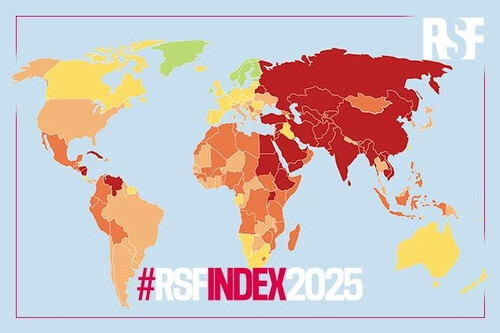
The 2025 World Press Freedom Index, released by Reporters Without Borders (RSF), has once again classified South Korea's media landscape as "problematic," ranking it 61st out of 180 countries. This marks the second consecutive year that South Korea has received this designation, despite a marginal one-place improvement from its 62nd position in the 2024 index. The country's score of 64.06 points places it firmly within the "problematic" category, signaling persistent challenges to journalistic freedom.
RSF's comprehensive annual report assesses the state of press freedom across the globe, categorizing nations based on the level of freedom afforded to journalists and media outlets. The categories range from "good" to "very serious," reflecting the diverse realities faced by the press worldwide. South Korea, once considered a regional leader in press freedom with a "satisfactory" rating maintained between 2018 and 2023, has experienced a concerning decline, falling into the "problematic" tier in the past two years.
The downgrade reflects a confluence of factors, most notably the intense political polarization that characterizes South Korean society. RSF highlights that while the country has historically respected press freedom since its democratization in the 1980s, the current political climate fosters an environment where media outlets perceived as critical or not aligned with a particular political stance face increasing hostility and denunciation. This partisan divide undermines the crucial role of the press as an independent watchdog, capable of holding all actors accountable.
Furthermore, the report underscores the persistent threat of defamation lawsuits against media organizations and individual journalists. South Korea's defamation laws are notably strict, carrying potential penalties of lengthy prison sentences, even in cases where the reported information is factual. While a public interest defense exists, its abstract nature fails to deter legal threats, creating a chilling effect on investigative journalism and critical reporting on sensitive issues, including government actions and corporate malfeasance. Rights groups in South Korea have consistently pointed out the misuse of defamation laws to stifle legitimate journalistic inquiry.
Harassment of journalists remains another significant concern. Reporters covering controversial topics or those affiliated with media outlets critical of powerful entities often face intimidation, both online and offline. This harassment can range from verbal abuse and online smear campaigns to more direct forms of pressure, creating a hostile environment that can discourage journalists from pursuing important stories.
The influence of corporate interests on the media landscape also poses a challenge to press freedom in South Korea. The close ties between some media outlets and large corporations can compromise the media's ability to act as an independent scrutineer of business practices and potential conflicts of interest. This can lead to self-censorship or a reluctance to publish critical reports that might jeopardize advertising revenue or corporate relationships.
In the broader global context, the 2025 World Press Freedom Index paints a concerning picture, with the overall global press freedom score reaching a new low, classified as "difficult" for the first time. RSF attributes this decline not only to physical violence against journalists but also to the increasing economic precarity faced by media organizations worldwide. This economic vulnerability can make media outlets more susceptible to political or corporate pressure.
Notably, the United States, a key ally of South Korea, also finds itself in the "problematic" category, ranking 57th. RSF specifically points to a significant decline in the "economic indicator" for the U.S., attributing this trend to the policies and rhetoric of the Trump administration. The report highlights how the administration has utilized economic pressure as a tool to undermine independent media.
In a move that has drawn significant criticism from press freedom advocates, President Trump recently signed an executive order to cut federal funding for public broadcasters NPR and PBS, alleging bias in their reporting. This action follows earlier moves by his administration to defund or dismantle entities like the U.S. Agency for Global Media (USAGM), which oversees international broadcasters like Voice of America and Radio Free Asia. While Trump claims these media outlets are biased, no specific instances of biased reporting were detailed in the executive order. Both NPR and PBS have a long-standing reputation for journalistic integrity and are often cited as among the most trusted news organizations in the United States. Leaders of both organizations have vowed to fight the funding cuts, arguing they are unlawful and undermine their ability to serve the public.
The global decline in press freedom, coupled with the specific challenges faced in South Korea – political polarization, restrictive defamation laws, journalist harassment, and corporate influence – underscore the fragility of independent journalism in even well-established democracies. The continued "problematic" classification for South Korea serves as a stark reminder of the ongoing need for vigilance and reforms to safeguard the vital role of a free and independent press in a democratic society. International organizations and domestic press freedom advocates will likely continue to monitor the situation closely and advocate for measures to improve the environment for journalists in South Korea.
[Copyright (c) Global Economic Times. All Rights Reserved.]




























